|
|
|
Sort Order |
|
|
|
Items / Page
|
|
|
|
|
|
|
| Srl | Item |
| 1 |
ID:
191120
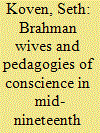

|
|
|
|
|
| Summary/Abstract |
This article argues that from circa 1845–1857, British colonial officials and administrators, abetted by Protestant missionaries and some so-called ‘native Christians’, attempted to replace Brahmanical regulation of everyday life with what I am calling ‘governance by conscience’ in British India. It uses the 1851 legal ruling in Narayen Ramchundur versus Luxmeebae, hailed by some for bringing ‘liberty of conscience’ and condemned by others as a wanton violation of Hindu personal law, to elucidate the connections between the Caste Disabilities Removal Act of 1850 (Act XXI) and education. My analysis highlights the centrality of Brahman wives and gender to debates about conscience, caste, property, and Christian conversion. During the violent summer of 1857, some condemned the Act and its use in deciding the case of Narayen Ramchundur versus Luxmeebae as provocation for the traumatic disorders then threatening to dismantle Britain's Indian empire.
|
|
|
|
|
|
|
|
|
|
|
|
|
|
|
|
| 2 |
ID:
174359
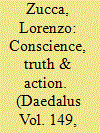

|
|
|
| 3 |
ID:
122993
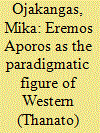

|
|
|
|
|
| Publication |
2013.
|
| Summary/Abstract |
The originary figure of the Western political subject is neither the Aristotelian zoon politikon nor the Agambenian homo sacer but the Socratic eremos aporos. Like the Agambenian homo sacer, the Socratic eremos aporos is abandoned by his fellow citizens, not outside the polis but in the polis, being a refugee in his own city. He lives, as Callicles says of Socrates in Gorgias (486c), "in his city as an absolute outcast." Moreover, like the Agambenian homo sacer, the Socratic eremos aporos also lives in a state close to death-"in a state as close to death as possible," as Socrates says of himself in Phaedo (67d). However, there is a decisive difference between the Agambenian homo sacer and the Socratic eremos aporos. Unlike homo sacer, the Socratic political subject is not abandoned by the sovereign but by himself through his own traumatic self-accusation. Furthermore, although eremos aporos is also a "living corpse," he is not thereby at mercy of the sovereign. On the contrary, it is he who has become sovereign, not because he has somehow managed to sublate his condition as abandoned and forlorn subject, but because this condition is the condition of sovereign freedom. In other words, it is neither his biological life in the order of nature (zoe) nor his form of life in the symbolic order of the polis (bios), not even his exposure to the threat of imminent death (homo sacer), but his symbolic suicide that renders him a sovereign individual subjected to no one. By removing the subject from his proper place in the symbolic order of the polis, such a suicide not only discloses subject's unlimited responsibility but also renders him capable of transcending his limited position as a living being and becoming a thanatopolitical subject of his own biological death. Although such a subject also affirms life, life that is affirmed here is not mere life but sovereign life in the shade of the instinct of death.
|
|
|
|
|
|
|
|
|
|
|
|
|
|
|
|
| 4 |
ID:
101843
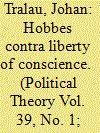

|
|
|
|
|
| Publication |
2011.
|
| Summary/Abstract |
It has often been argued that, notwithstanding his commitment to the authoritarian state, Thomas Hobbes is a champion of the "minimal" version of liberty of conscience: namely, the freedom of citizens to think whatever they like as long as they obey the law. Such an interpretation renders Hobbes's philosophy more palatable to contemporary society. Yet the claim is incorrect. Alongside his notion of "private" conscience, namely, Hobbes develops a conception of conscience as a public phenomenon. In the following, it is argued that this inconsistency serves the purpose of deception: it holds out the possibility of dissent while making it impossible to utilise. Arguably, moreover, this is the proper hermeneutical approach to take to Hobbes's inconsistencies in general. Indeed, said inconsistencies ought to alert contemporary normative theorists to the instability of the "minimal" version of liberty of conscience attributed to Hobbes: Hobbes himself, namely, shows that it is insufficient.
|
|
|
|
|
|
|
|
|
|
|
|
|
|
|
|
| 5 |
ID:
144748
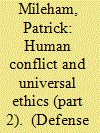

|
|
|
|
|
| Summary/Abstract |
This second part of the review article begins with a definition of military power, when and how it should be used. From a large number of authors, “moral forces” are linked to “codes of conduct”, and the fundamental understandings about the “profession of arms”, based on “fiduciary trust”, “covenanted” service and professional and personal “conscience”. The article covers what authors have written about “culture” and the ethics of “technology” devices and systems, including “cyber” warfare. It concludes with recognition of the increase in ethical sensitivity in this century which is characterized by a phenomenon, the crises of “identity”, personal, national and global.
|
|
|
|
|
|
|
|
|
|
|
|
|
|
|
|
| 6 |
ID:
168865
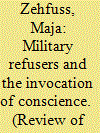

|
|
|
|
|
| Summary/Abstract |
During the Iraq War, some US soldiers refused (re)deployment. While liberal states appear to protect individuals’ right not to fight against their moral convictions by allowing the right to conscientious objection, those whose objections do not align with the regulations have to break the law in order to follow their convictions. This article explores how the legitimation of liberal war is challenged when we listen to the stories such refusers tell. Focusing on the United States, it briefly sets out the normative context such soldiers faced, highlighting the distinction between permissible conscientious objectors and contemptible deserters. Drawing on Judith Butler, it then focuses on two refusers by reading their own accounts of themselves in their memoirs. Despite not being eligible under the regulations, both invoke their conscience to make their refusal intelligible. By listening to their detailed accounts, the article traces the production and disruption of their subjectivities in relation to the prevailing moral order. Although invoking conscience appears to provide the chance to embrace an authentic self in a bid to resist the problematic moral order, subjectivity remains fractured due to relationality. Put differently, the sovereign subjectivity required by liberal war is simultaneously undermined by it.
|
|
|
|
|
|
|
|
|
|
|
|
|
|
|
|
|
|
|
|
|